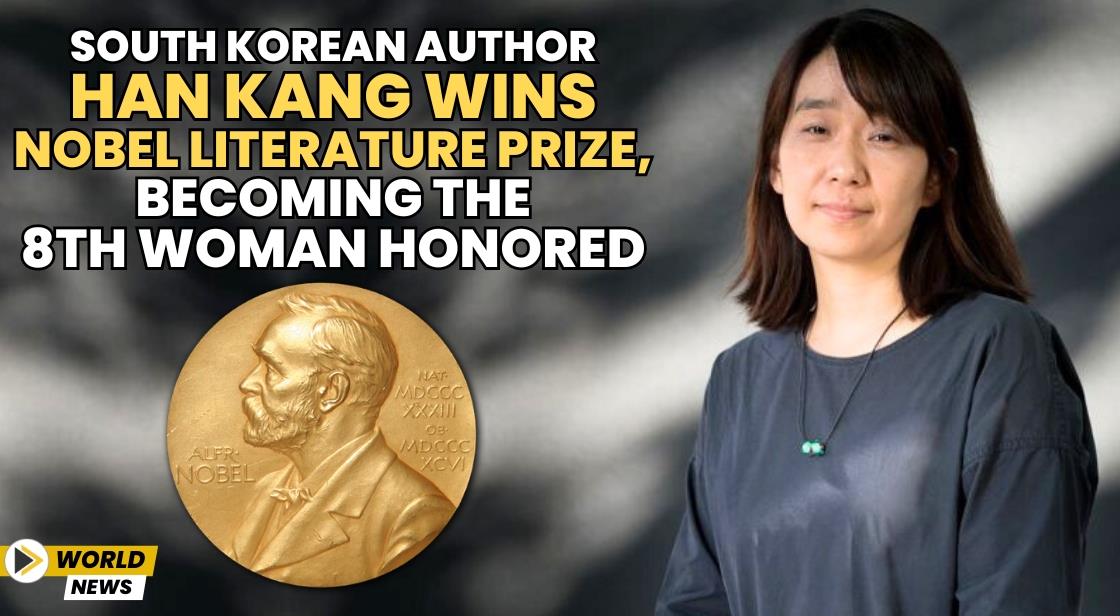South Korean Author Han Kang Wins Nobel Literature Prize, Becoming the 8th Woman Honored

News Synopsis
The prestigious 2024 Nobel Prize in Literature has been awarded to South Korean author Han Kang for her remarkable body of work that explores historical traumas and the fragility of human life. Her "intense poetic prose" and innovative style have garnered global recognition. The award, announced by the Nobel Committee at the Swedish Academy, adds to the growing list of Nobel Prize announcements made in various categories, including Medicine, Physics, and Chemistry.
Han Kang’s Poetic Exploration of Life’s Fragility
Han Kang, born in 1970, is celebrated for her unique literary approach that intertwines body, soul, and the complex relationships between life and death. Her writing delves deep into historical events and personal traumas, revealing the delicate nature of human existence. The Swedish Academy highlighted her innovative storytelling that confronts the invisible rules governing society. Her works, often described as poetic and experimental, have redefined contemporary prose and stand out for their powerful narrative voice.
International Breakthrough: The Vegetarian and Its Impact
Han Kang's major international breakthrough came with her 2015 novel The Vegetarian, which brought her widespread acclaim. This novel, structured in three parts, tells the story of Yeong-hye, a woman who refuses to conform to societal norms, particularly regarding food. Her decision to stop eating meat leads to unexpected and violent consequences, sparking various emotional responses from those around her. The Vegetarian explores themes of autonomy, defiance, and the consequences of rejecting established norms. It quickly became a symbol of Han Kang’s daring narrative style, making her a global literary force.
Han Kang Joins a Select Group of Nobel Laureates
Han Kang is now the 8th woman to win the Nobel Prize in Literature. This achievement places her among an elite group of female authors who have made significant contributions to global literature. The last woman to receive the prize was Annie Ernaux of France in 2022. The Nobel Prize in Literature, one of the most prestigious literary awards in the world, has been awarded 116 times since its inception in 1901. Unlike other Nobel categories, the literature prize has never been awarded to a single individual twice, although it has been shared between two individuals on four occasions.
Historical Context: Alfred Nobel’s Cultural Interests and the Birth of the Prize
Alfred Nobel, the inventor of dynamite and the creator of the Nobel Prizes, had a lifelong passion for literature and the arts. His wide-ranging literary interests inspired him to include a prize for literature in his will. Nobel himself dabbled in writing fiction during his later years, a fact that perhaps led to his deep appreciation for the written word. His vision for the Nobel Prize in Literature was clear – it should honor those who have provided "the greatest benefit to mankind" and whose work is "in an ideal direction." This idealism continues to guide the selection process for the prize.
Global Nobel Prize Announcements in 2024
The 2024 Nobel Prize in Literature follows several key Nobel announcements. The Nobel week began on October 7, with the Medicine Prize going to American researchers Victor Ambros and Gary Ruvkun for their groundbreaking work. On October 8, the Physics Nobel was awarded to John Hopfield and Geoffrey Hinton for their contributions to neural networks. The Chemistry Prize, announced on October 9, honored three scientists for their pioneering research in decoding and designing novel proteins.
The prestigious Nobel Peace Prize will be announced tomorrow, and the Nobel Prize for Economics is set to be awarded on October 14. All Nobel laureates will be invited to the official Nobel Prize ceremonies, which are held annually on December 10, marking the anniversary of Alfred Nobel’s death.
The Legacy and Ceremony of the Nobel Prize
Since the first Nobel Prizes were awarded in 1901, the Nobel ceremony has become a grand tradition, culminating in the Nobel Week celebrations. Each laureate is honored with a gold medal featuring Alfred Nobel’s image and a uniquely designed diploma. The Nobel diplomas for literature are written on parchment using medieval techniques, while the other laureates receive diplomas made from handmade paper.
In Stockholm, the Nobel Week ends with the award ceremony at the Stockholm Concert Hall, followed by a lavish banquet where laureates dine with the Swedish royal family. The ceremony highlights not only the achievements of the laureates but also Alfred Nobel’s lasting legacy.
The Nobel Peace Prize and the Role of the Norwegian Parliament
While most Nobel Prizes are awarded in Sweden, the Nobel Peace Prize is presented in Oslo, Norway. The Peace Prize is selected by a committee appointed by the Norwegian Parliament, a practice that has been followed since the first awards were given out in 1901. This distinction underlines the importance of global collaboration and peace, a central theme in Nobel’s vision for the future.
A Nobel Legacy for Future Generations
The Nobel Prizes, including the 2024 Literature Prize awarded to Han Kang, represent the culmination of years of dedicated work by individuals who have significantly contributed to humanity’s progress. With each Nobel ceremony, new chapters are added to the legacy of Alfred Nobel, inspiring future generations of scientists, writers, and peacekeepers to continue working toward the betterment of mankind.
Han Kang’s award is not just a personal victory but also a triumph for literature and its power to confront uncomfortable truths, explore the human condition, and inspire change.









